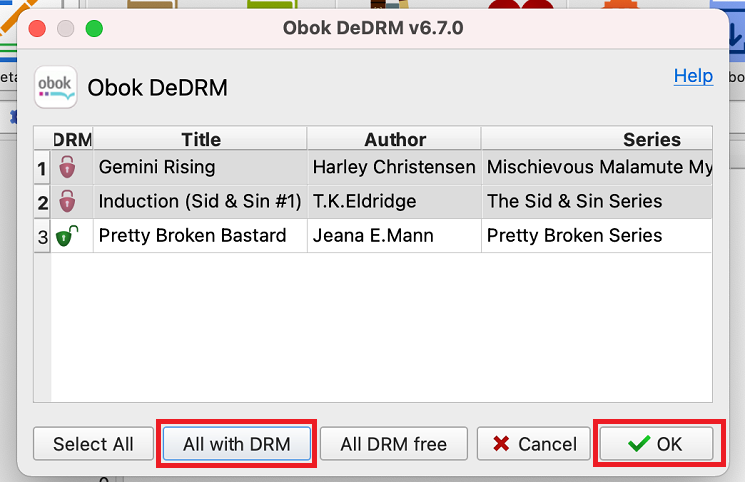

- #Add key to dedrm calibre activation key#
- #Add key to dedrm calibre .exe#
- #Add key to dedrm calibre install#
- #Add key to dedrm calibre zip file#
- #Add key to dedrm calibre zip#
If you get an error about not being able to find default keys, it may help to run Calibre from a terminal so you can see what errors the Python script is reporting, as suggested above. With a bit of luck DeDRM will find a key and ask you to name it. In the dialog box that pops up, enter the absolute path of your WINEPREFIX in the relevant field (eg, “/home//.wine32”) and click on the green “+”. So for me, the line I had to include was: libcrypto = 'C:\\users\\\\Local Settings\\Application Data\\Programs\\Python\\Python38-32\\DLLs\\libcrypto-1_1.dll'.īack in Calibre, go to Preferences > Plugins and locate the DeDRM plugin (eg, by searching for “drm”) and click “Customize plugin”. Note that you have to use the Windows convention here, with (escaped) backslashes and using “C:” at the beginning instead of $WINEPREFIX/drive_c. This doesn’t seem to work under Wine (at least, it didn’t for me) so comment the line out and include another line directly after it setting the “libcrypto” variable to the absolute path to your librcrypto DLL file. On or about line 119 of the adobekey.py script, there is a line libcrypto = find_library("libea圓2"). I found the script at $HOME/.config/calibre/plugins/DeDRM/libraryfiles/adobekey.py. The plugin will attempt to find this key for you using a Python script, but I had to tweak it slightly to get it to work. Once installed, you’ll need to configure it with a key. In Calibre, go to Preferences > Plugins > Load plugin from file, and select the DeDRM_plugin.zip file referred to above.
#Add key to dedrm calibre zip#
Unzipping the file you have downloaded will extract a number of other zip files, including “DeDRM_plugin.zip”.
#Add key to dedrm calibre zip file#
Get release 7.1.0 of the Calibre DeDRM plugin by downloading the zip file from the GitHub Releases page. For me, this was “$WINEPREFIX/drive_c/users//Local Settings/Application Data/Programs/Python/Python38-32/DLLs/”.

This should put a file called “libcrypto-1_1.dll” or similar into your Python DLLs directory in your Wine directory.
#Add key to dedrm calibre install#
Then run WINEPREFIX="$HOME/.wine32" wine cmd /c py -m pip install pyopenssl to install pyOpenSSL. Make sure pip is installed too (it should be by default). Run WINEPREFIX="$HOME/.wine32" wine cmd /c "" and follow the install process.
#Add key to dedrm calibre .exe#
exe installer and be sure to choose a sub-version that works with the version of Windows your Wine is configured to run as (for example, if Wine runs as Windows 7, 3.9 won’t work). Download a Python 3 installer from the Python website. Next, install Python 3 and pyOpenSSL under Wine. If you have an ACSM file (called “URLLink.acsm” or similar), rather than an EPUB, click File > Add to Library and open the ACSM file. Some posts online suggest that it is a better idea to download ADE version 2 or 3 as those versions apparently use a more easily removed form of DRM.įor the rest of the steps I’ll assume your WINEPREFIX is “$HOME/.wine32”.ĪDE should open automatically upon installing it if not, you should find it somewhere like “$WINEPREFIX/drive_c/Program Files/Adobe/Adobe Digital Edition 4.5”.

I installed version 4.5.11, so that is what these instructions are tailored for.
#Add key to dedrm calibre activation key#
This worked for me… if it doesn’t work for you I suggest running Calibre from the command line, you’ll be able to see the errors that DeDRM throws when it tries to decrypt your ADE activation key Set the WINEPREFIX to whatever you used (in my case, you can see it was /home/username/.wine32… if you used /home/yourusername/.adewine then you should use this, it’s totally dependent on how you installed ADE!) In Calibre, install DeDRM and configure it.WINEPREFIX="$HOME/.wine32" wine msiexec /i ~/Downloads/python-2.7.18.msi



 0 kommentar(er)
0 kommentar(er)
